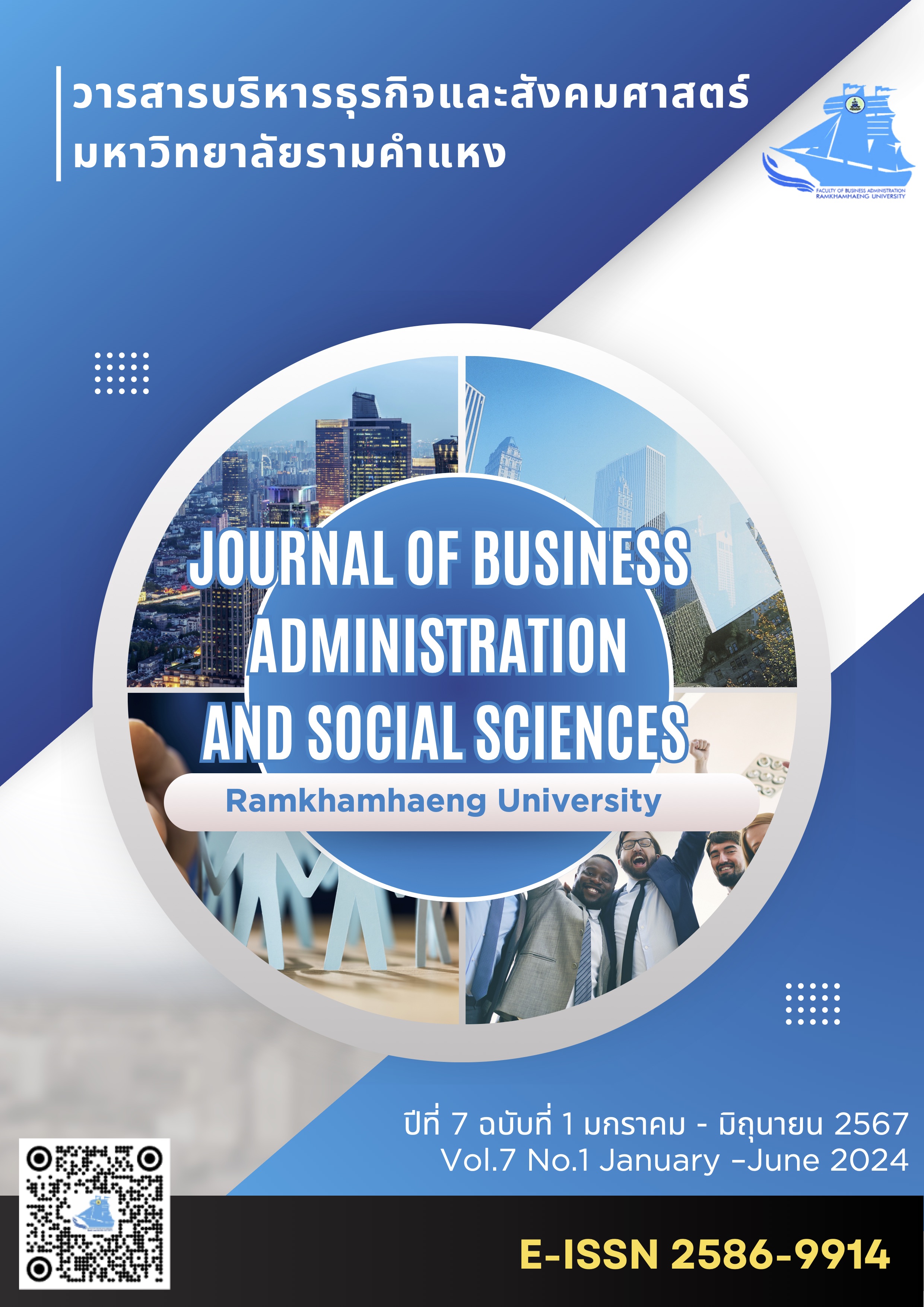Exploratory Factor Analysis of Workforce Adaptation in Hospitality and Tourism Industry After the COVID-19 Pandemic
Main Article Content
Abstract
In this research investigation, the researcher conducts 1) an exploratory factor analysis of the workforce adaptation in the hospitality and tourism industry after the COVID-19 pandemic; and evaluates 2) the level of adaptation and the adaptation needs of the workforce under study. The research methodology of quantitative approach was employed. The sample population consisted of 400 personnel who are currently working or used to work in the hospitality and service industry. The research instrument was a questionnaire. Data were analyzed using the descriptive statistics of frequency, percentage, and mean. The inferential statistics employed was the exploratory factor analysis (EFA).
Findings showed that the four components identified were customer responsiveness; emotional management; ethics and responsibility; and communication. The evaluation of the level of adaptation and the adaptation needs of the personnel under study found the following. The personnel exhibited adaptation in the aspect of customer responsiveness at the highest level. They also had the adaptation needs in the aspect of ethics and responsibility at the highest level.
Article Details

This work is licensed under a Creative Commons Attribution-NonCommercial-NoDerivatives 4.0 International License.
เนื้อหาและข้อมูลในบทความที่ลงตีพิมพ์ในวารสารบริหารธุรกิจและสังคมศาสตร์ มหาวิทยาลัยรามคำแหง ถือเป็นข้อคิดเห็นและความรับผิดชอบของผู้เขียนบทความโดยตรง ซึ่งกองบรรณาธิการไม่จำเป็นต้องเห็นด้วย หรือร่วมรับผิดชอบใดๆ
บทความ ข้อมูล เนื้อหา รูปภาพ ฯลฯ ที่ได้รับการตีพิมพ์ในวารสารบริหารธุรกิจและสังคมศาสตร์ มหาวิทยาลัยรามคำแหง ถือเป็นลิขสิทธิ์ของวารสารบริหารธุรกิจและสังคมศาสตร์ มหาวิทยาลัยรามคำแหง หากบุคคลหรือหน่วยงานใดต้องการนำบทความทั้งหมดหรือส่วนหนึ่งส่วนใดไปเผยแพร่ต่อ หรือเพื่อกระทำการใดๆ จะต้องได้รับอนุญาตเป็นลายลักษณ์อักษรจากวารสารบริหารธุรกิจและสังคมศาสตร์ มหาวิทยาลัยรามคำแหง ก่อนเท่านั้น
References
กอบชัย เมฆดี และศศินันท์ ศาสตร์สาระ. (2566). การพัฒนาสมรรถนะผู้นำเพื่อส่งเสริมการท่องเที่ยว อัจฉริยะ กรณีศึกษาชุมชนท่องเที่ยวในเขตจังหวัดภาคกลางตอนบน. Journal of Social Science and Cultural, 7(01), 60-77.
กัลยา วานิชย์บัญชา. (2549). สถิติสำหรับงานวิจัย (พิมพ์ครั้งที่ 2). กรุงเทพ: โรงพิมพ์พิมพ์จุฬาลงกรณ์มหาวิทยาลัย.
เกษวดี พุทธภูมิพิทักษ์, จารุวรรณ แดบุบผา และอลงกต ยะไวทย์. (2566). สมรรถนะจิตบริการแบบไทยที่ โดดเด่นเพื่อการพัฒนาบุคลากรในอุตสาหกรรมการท่องเที่ยวและจิตบริการ. วารสารมนุษยศาสตร์และสังคมศาสตร์ มหาวิทยาลัยอุบลราชธานี, 14(1), 280-307.
จริยา ตันติวราชัย และอนุชิต จันทรโรทัย. (2560). คุณลักษณะที่พึงประสงค์ของบุคลากรในอุตสาหกรรม การบริการและการท่องเที่ยว. Journal of Information, 16(1), 27-36.
จ็อบไทย จำกัด . (2563). JobThai เผยความต้องการแรงงานครึ่งปีแรกของปี 2563 และผลกระทบจากสถานการณ์ COVID-19. สืบค้นจาก https://blog.jobthai.com
ฐิติยา เนตรวงษ์. (2565). แรงงานทักษะดิจิทัลของพลเมืองแห่งศตวรรษที่ 21 เพื่อรองรับเทคโนโลยีพลิกผัน บนชีวิตวิถีถัดไป. วารสารวิทยาการจัดการ, 2(1), 1-15.
ณัฐณิชา พ่วงอ่างทอง. (2566). ความเครียดและภาวะหมดไฟของการทำงานที่บ้านในช่วงโควิด-19 ที่ ส่งผลต่อประสิทธิภาพการปฏิบัติงานของพนักงานบริษัทในเขตกรุงเทพมหานคร. ปริญญาการจัดการมหาบัณฑิต วิทยาลัยการจัดการ, มหาวิทยาลัย มหิดล.
ทัศนมินทร์ รัชตาธนรัชต์ ณีรนุช วงค์เจริญ และสรรเพชญ เรืองอร่าม. (2565). ประสิทธิผลของโปรแกรม การพัฒนาทักษะ ทบทวนทักษะ และเสริมสร้างทักษะชีวิตวิถีใหม่ของบุคลากรธุรกิจการท่องเที่ยวใน การป้องกันการแพร่กระจายเชื้อโรคโควิด 19 เกาะสมุย จังหวัดสุราษฎร์ธานี. Journal of Health Science of Thailand, 31(2), 211-223.
เนื้อแพร เล็กเฟื่องฟู และคณะ. (2563). เมื่อโควิด-19 ปิดเมือง: ผลกระทบต่อแรงงานไทยในมิติ supply-side. สืบค้นจาก https://www.pier.or.th/abridged/2020/08/
พิริยะ ผลพิรุฬห์. (2565). การปรับตัวของแรงงานในภาคการท่องเที่ยวในยุคโควิด-19. สืบค้นจาก http://econ.nida.ac.th/2022/03/
รุจิรา พลแพงขวา และสจี กุลธวัชวงศ์. (2561). การพัฒนาบุคลากรด้านอุตสาหกรรมการท่องเที่ยวและบริการในจังหวัดอุดรธานีเพื่อเพิ่มขีดความสามารถในการแข่งขัน. วารสารวิทยาลัยบัณฑิตเอเซีย, 8(1). 10-17.
ศิริชัย กาญจนวาสี. (2544). การเลือกใช้สถิติที่เหมาะสมสําหรับการวิจัย (พิมพ์ครั้งที่ 4). กรุงเทพฯ:
บุญศิริการพิมพ์.
ศูนย์วิจัยกสิกรไทย. (2564). เจาะรายอุตสาหกรรมอ่วม “โควิด” บางส่วนปีหน้าก็ยังไม่ฟื้น. สืบค้นจาก https://www.prachachat.net/breaking-news/news-547455
ศูนย์วิจัยธนาคารกรุงไทย. (2563). เจาะพฤติกรรมท่องเที่ยวใน New Normal: เมื่อโควิดทำชีวิตเปลี่ยน. สืบค้นจาก https://krungthai.com/Download/
สำนักงานสถิติแห่งชาติ. (2563). ภาวะการทำงานของประชากร. สืบค้นจาก http://www.nso.go.th/
สำนักงานสภานโยบายการอุดมศึกษา วิทยาศาสตร์ วิจัยและนวัตกรรมแห่งชาติ (สอวช.). (2564). ทักษะมนุษย์-แรงงานที่จำเป็นสำหรับประเทศไทยในโลกหลังโควิด-19. สืบค้นจาก https://www.mhesi.go.th/index.php/news/4918-19-38.html
เสาวนีย์ จันทะพงษ์ และ กำพล พรพัฒนไพศาลกุล. (2562). การยกระดับทักษะแรงงานไทย: โจทย์ใหญ่ในยุคเทคโนโลยีเปลี่ยนโลก. สืบค้นจาก https://www.bot.or.th/th/research-and-publications/
เสาวณี จันทะพงษ์ และ เจริญชัย เอกมาไพศาล. (2564). ผลกระทบและการปรับตัว (Resilience) ของผู้ประกอบการธุรกิจโรงแรมและร้านอาหารช่วงโควิด-19:วิเคราะห์จากหลักคิด Outside-In. สืบค้น จาก https://www.bot.or.th/Thai/
Cochran, W. G. (1977). Cochran-sampling Technique. John Wiley and Sons, New York, 448, 127.
Gaskel, A. (2019). What Are The Top 10 Soft Skills For The Future Of Work?. Retrieved from https://www.forbes.com/sites/
Gray, A. (2016). The 10 skills you need to thrive in the Fourth Industrial Revolution. Retrieved from https://www.weforum.org/agenda/2016/01/the-10-skills-you-need-to-thrive-in-the-fourth-industrial-revolution/
Roy, C., & Andrews, H. (1999). The Roy adaptation model (2nd ed.). Stamford: Appleton & Lange.
World Economic Forum. (2020). The future of jobs report 2020. Retrieved from https://www.weforum.org/reports/


